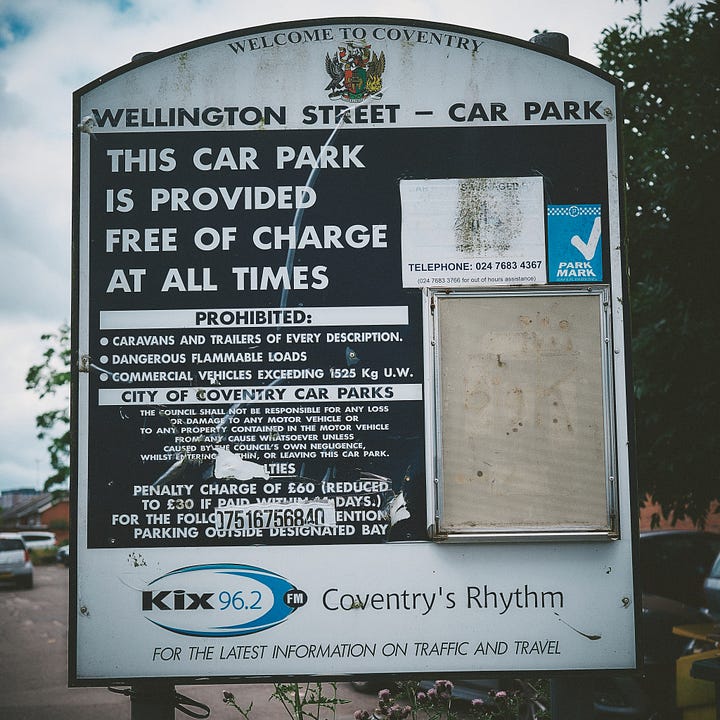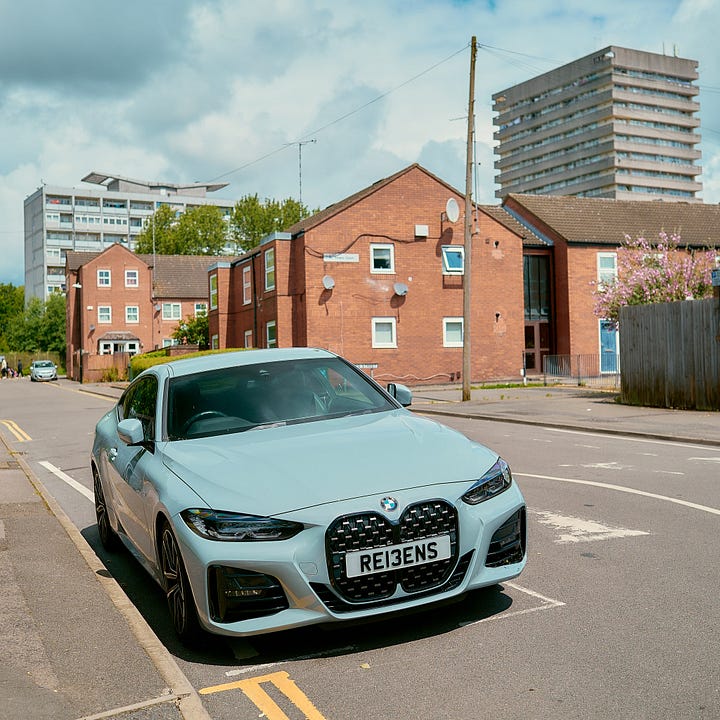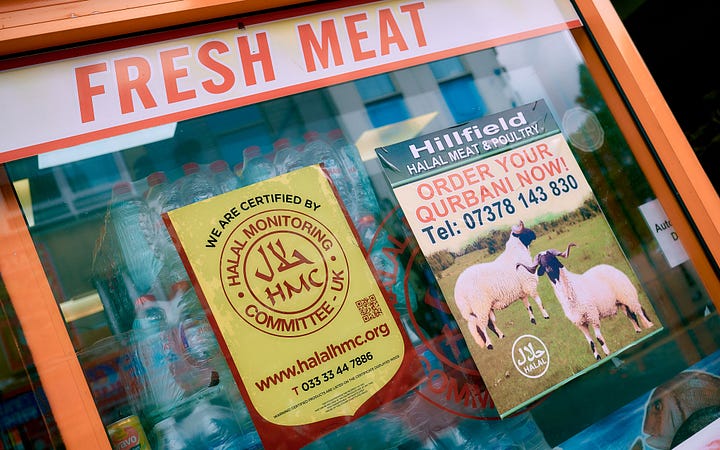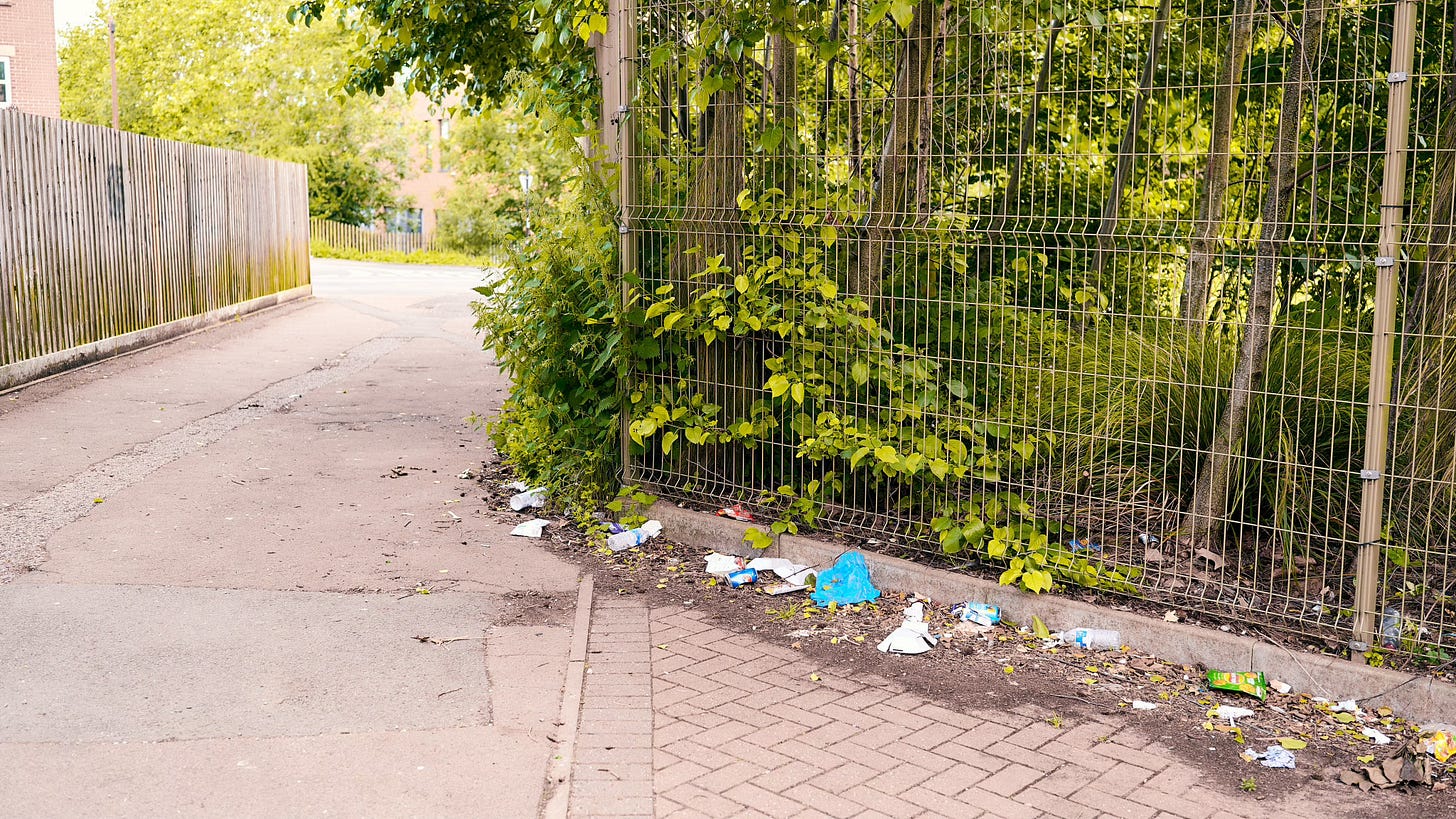Front line urban strife in commie Coventry
A happenstance conflict with a school teacher raises questions about child protection
My travels around Britain in the last few months have taken me from the far north of Scotland right down to the far end of Cornwall. It has required a conscious effort to document the conditions of the poorer parts of the country. They are not my “native habitat”, and I do get to “socially hyperspace” occasionally into the high end of London fashion stores, Oxford colleges, or country mansions. These adventures are a kind of modern “urban strides”, to riff off the famous Rural Rides of C19th parliamentarian William Cobbett. Each venue comes with its own unique vibe, and the encounters I have are as diverse as the localities.
There are moments on some of my photo walks when I know I have the story, as it happens in a few moments; on other occasions, I have to step back and survey the whole experience to extract the message. In early June I was staying with friends in the Midlands as I journeyed south from my home in County Durham towards family near London. The nearest urban centre is Coventry, so I went to the most deprived area — as a proxy for similar locations in Birmingham, Wolverhampton, or Leicester. My specific target was Hillfields, just outside the inner ring road that detaches the old city heart from its modern body.


Coventry is a bittersweet location, having been one of Europe’s best-preserved medieval towns prior to the bombing of WW2. It was once part of the Midlands industrial powerhouse, and had a thriving manufacturing base, which has declined. Along with comparable areas, its ethic mix has shifted radically away from the indigenous British. While tourists flock to Oxford, York, and Bath, poor old Coventry is now a relative cultural backwater having been destroyed and still damaged. I had never been there before, and have learned not to come with preconceptions of my visit.
It took me some “hesitation, deviation, and repetition” to locate a parking space, and was not quite where I had anticipated beginning my photo walk. I have two bags in the back of my van — one with my “fancy” camera gear and multiple lenses, and the other with my laptop and a small street camera. Being the middle of the day and believing in living fearlessly, I took the former. As I meandered closer to the tower blocks where the urban grit was to be found, a friendly man turning his car stopped and wound his window down to ask what I was taking pictures of. I explained how I was going around Britain on my own account to document distressed territories.


He was enthused by my mission, but counselled that I might want to be careful waving my camera around: “This area is full of drug dealers and gangs around 2 or 3am, and even in the daytime some people might not appreciate having their picture taken. We call it the ‘front line’ along that road up there, as it is the frontline of a war zone.” I accepted his advice as coming from a good place of care for my welfare, and pottered along to the “enriched” zone to see what I could capture, mindful of the risks. I don’t have insurance for my camera gear — it is very expensive — and if I ever lose it, then I will fall back to older or borrowed kit.
As it happens, the area was no more threatening than many parts of London I am habitually found in. That said, one person did comment behind me and I overheard the word “camera”. I felt a little bit out of place, as I stick out — a pale and lanky intellectual over-equipped for a trip to the shops — and the area around the residential tower blocks was not the most welcoming. I decided that I would be more comfortable trekking about Coventry with my inconspicuous street camera, rather than thousands of pounds of obviously professional-grade gear. So I turned about and started to head back to my van, to swap over.
Passing down the side fence of a school, I was struck by the tower blocks behind the fencing, so stopped to grab the juxtaposition. As I refocused, a middle-aged woman in a yellow fluorescent jacked stormed up to the fence, and glowered at me. At this point, you will have to excuse my extreme crudeness, but her face was so disgustingly sour that I later described it to a friend thus: imagine an old hag whose only friend in the whole world was a sex toy, and even that had abandoned the relationship. It was a vile, accusatory, malevolent look — absolutely incongruous to my benevolent and honourable endeavour to do amateur street photojournalism.
Being a playful kind of person, I piped up “Hi, I am Martin! How can I help you?” This immediately put her off balance, as I was coming from a place of love, not hate or indifference.
“What are you doing here? This is a school and you cannot photograph children!”
“I am sorry, but I am taking a picture of the tower blocks through the fence.”
“Well, you can do that further down the street!” she angrily retorted. I was amused, as she apparently is able to give me expert advice on photographic composition. She stared at me, as if I was a wicked child who had bitten another’s ear in the playground.
“I am lawfully doing street photography, and the expression you have on your face is totally inappropriate.”


She wasn’t used to being told off, and her appearance turned from hatred to fury. So I carried on: “I am lawfully doing my work, and you have no business telling me what to do.”
“Why are you here?!?”, she barked.
“That is none of your business”, I stated coldly. And added again that her expression was absolutely inappropriate and unprofessional.
“What is your name?!!!”, was the demand back, as she had clearly not paid attention at the outset.
“That is also none of your business. What is the authority by which you are asking me these questions?” was my response. I know that I am doing nothing immoral or illegal, so owed her zero courtesy at this point.
About to explode with self-important indignation, she stepped back, took out her phone, and made a call. I presume it was to the headmistress, but could have been the police, or some other body. I had no reason to wait around, or give her any more of my energy, I just turned away, went to my van, swapped over cameras, and carried on along the other side of the school towards my destination. I was more enervated than annoyed, as I immediately knew I had my story — that the real danger was not drug dealers or petty thieves, but a “native” who had gone full-on communist, yet was in charge of precious children. She should absolutely not be in that role with that evil spirit.
I had another minor encounter later in Coventry when another man challenged me for taking photographs in an area dominated by Muslims. I did have my camera pointed in the direction of him and his family at one point as I did a “locating shot” of a bus stop to record the name of the spot I was in. I did show him what I took on my screen, explained why I did so, and shook his hand as he accepted that he had no cause to interrupt me. While he didn’t have any right to stop me and get me to take my earbuds out, he did so in a manner that was not aggressive, and stepped back from his overreach. There was respect in both directions, and hence no loss of face.
I have told this story to some friends, and what I have noticed is that those with children still in mainstream schooling tend to go into “Agent Smith” mode, and programmatically defend the teacher. Surely she was rightfully protecting children, and I was acting suspiciously? Actually, no. I was on a public pavement and wasn’t photographing school children. Even if I was, it’s not a crime, just a bit creepy and bad manners. She could have approached me with appropriate curiosity and simply expressed her own anxiety — “I am tasked with looking after these pupils in their break and a man outside school with a camera makes me uneasy”. That would have been a factual feeling, and one I could engage with.
The word that comes to mind to describe the attitude and appearance of this teacher is “demented” — like demonic possession. She was so full of her own power and status that she was incapable of engaging in ordinary human discourse with a member of the public passing by. Her authority is the state, and is ungodly; a communist ideology. She implicitly believes she is above the law, which is what ultimately governs our society and interactions. Having overstepped and made a mistake, her pride meant she could not back down. By doubling down on her error and demands, with no standing to do so, she only made a fool of herself.
All I can say is that based on this one encounter, the children of Coventry are not in good hands, even if there are plenty of good caring people about. The front line of this conflict is not on the street where the junkies roam, but in the school where the officials act out their power trips. The failure of the cover-up for the Covid war crimes inevitably collapses these institutions, and takes the salaries and pensions of many of those who sold their souls and harmed the children. There is no need for me to complain about the behaviour of this particular teacher, the system protects its own. A judgement day is coming regardless, and I cannot imagine she will have access to children once it does.
I saw a face of wickedness, and it was on the other side of the fence, on a school teacher. The protection of children is used as a veil for disgusting behaviour. Her visage was a hideous look that I will never forget. Children are exposed to the same look and don’t have the power to walk away. I met a communist in Coventry — who serves a false idol. False teachers are more deadly than drug dealers or street thugs.















U experienced a flip of “universes” whereby those we expect to be good are evil. The opposite can also occur. An encounter with someone who appears scary when in fact acts benevolently. U r now a seasoned warrior as that has been our reality since we awoke. U seem to handle these encounters with more grace than I am capable of. I’m more often like a spinning spitball. My shame.
Like very much your trips around the deprived areas of the UK.
You deal with people in a way that I admire, and would like to emulate.
Peace and goodwill.